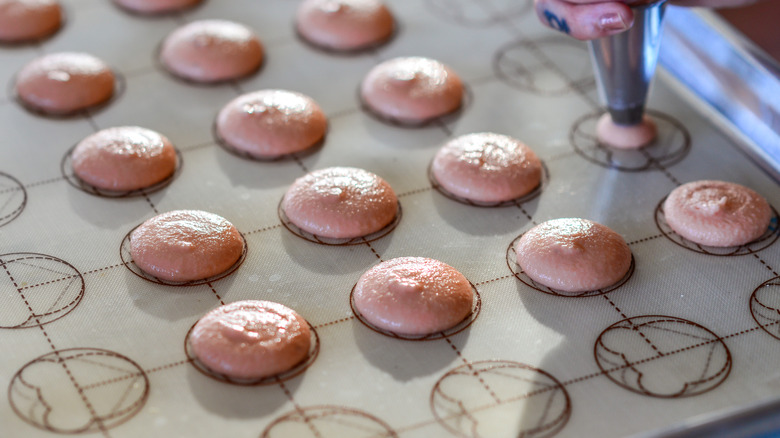The Key To Getting Perfect Macaron 'Feet'
Perhaps the most recognizable feature of the French macaron is its "feet," the crinkly band at the base of the cookie. Well-formed feet are a sign of an expertly-baked macaron. Ideally, feet should rise straight up in an even, delicately textured ring. They should be high but not too high, shouldn't spread too far out, and shouldn't be too rough or ruffly. But while overly tall or textured feet might not impress a French pastry chef, most amateurs will tell you that getting feet at all is a major accomplishment.
Macarons are notoriously difficult to troubleshoot. Each problem can have multiple, sometimes contradictory, solutions. A wrinkly top could either mean that your oven is too hot or too cold. Hollow macarons? You could have over-whipped the meringue or under-whipped it. But there's one key mistake that beginners often make: forgetting to rest the macarons before baking them, or not resting them long enough.
To get the perfect macaron feet, resting your macarons is absolutely essential. Resting gives the batter time to dry and form a "skin" over the top of the cookie. When macarons bake, the bottom of the macarons cook quickly thanks to the heat of the baking sheet. This causes the batter to expand upwards and outwards, pushing the top up and bubbling out at the sides. If the macarons are properly set, the skin will stay intact and rise in one smooth piece as those oh-so-hard-to-achieve feet form. If the cookies are still wet going into the oven, they'll burst open or refuse to rise at all.
Why is it important to rest macarons?
There's a good reason why so many bakers mess up: recipes tend to give misleading advice. Some recipes claim that you only need to rest the cookies for 15 to 20 minutes, others suggest an hour. Some recommend drying them overnight, and others don't call for resting at all.
Don't listen to the recipes. Instead, look for the telltale signs that your macarons are ready to bake. Well-rested macarons should have dull, matte skin and feel dry to the touch. Generally, 40 minutes to an hour will do the trick, but a recipe that drys in 30 minutes one day might need an hour and a half the next. Macarons are sensitive to humidity, so you'll need to wait longer if the weather is wet. Even minor fluctuations can have a big impact: some bakers even claim that running the sink or dishwasher while resting macarons can keep them from drying properly.
Ultimately though, sometimes even well-rested macarons fail to develop feet. If your macarons still aren't rising after several attempts, try a new tactic. A lack of feet often indicates that there isn't enough air in the batter, so make sure that your meringue forms stiff peaks and be careful to avoid over-mixing when you fold in the dry ingredients. A little cream of tartar or egg white powder can help stabilize the meringue and make it easier to work with.
Still having trouble? Re-assess the rest period. Over-resting can deflate these contrary cookies, too.

